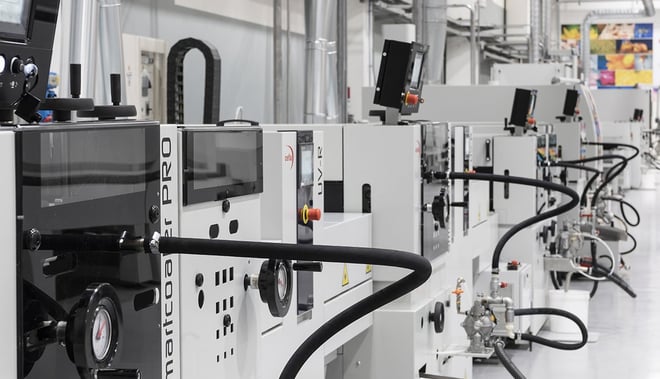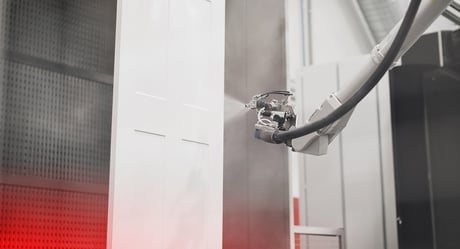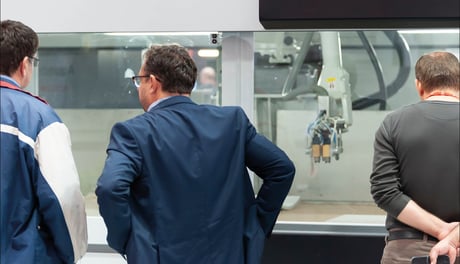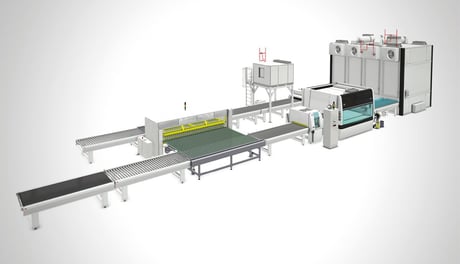
Roller coating on wood and its derivatives is an ideal way to accurately and evenly apply coating on panels, cabinet doors, doors, flooring and any other object with flat surfaces. Various techniques and lines are available to help you set up this type of process: each one has specific characteristics and, depending on the type of result you wish to achieve, has its own pros and cons.
While a customised solution is always the best response to any manufacturer's finishing needs, this article gives a general overview of how wood and wood-derivative roller coating machines work and illustrates their advantages.
When should roller coating be used for wood and its derivatives?
These days, roller coating is universally seen as a tried and tested industrial technique. This is thanks to increasingly reliable technology. Such technology meets the needs of a variety of product categories (one of the foremost being items in the furnishing sector), with panel and edge coating playing a crucial role in the wooden accessory manufacturing process.
In addition to wood and its derivatives, roller coating is also suitable for glass, cork, plastic and fibre cement surfaces. Indeed, a growing number of companies are choosing it to make production more efficient and boost their capacity for differentiated production. Lines can, in fact, be customised to meet specific requirements; they’re designed to meet the needs of both companies that repeatedly perform large-volume, same-batch processing and plants that require frequent colour and thickness changes, thus reducing downtime. A roller coating line maximises flexibility: this makes it perfect for third-party finishing set-ups, which require that the switch from one colour or thickness to another be completed without prolonged machine downtime.
THE MOST INNOVATIVE FINISHING SOLUTIONS
Discover new finishing solutions: more effective, more productive, more competitive
Composition of roller coating lines for wood and wood derivatives
Getting into the specifics, what do wood and wood-derivative roller coating lines consist of?

The lines are generally made up of a sander, followed by coaters which, in turn, precede a series of UV ovens.
After the sanding process, if the panels have flat edges (i.e. a sharp edge with respect to the surface), coatings are mainly applied with roller machines and curtain coaters to obtain finishes with differing degrees of gloss.
On a modern coating line, being able to control the process via interactive dashboards is essential: by monitoring performance, manufacturers can boost the operational versatility of their plant over time.
Moreover, manufacturing companies require maximum flexibility across a range of different products. That’s why they increasingly choose easy-to-use, modular, customisable solutions that smoothly adapt to production/space requirements and contain consumption: not just in terms of the stability of the basis weight of the applied coating and the reduced need for cleaning solvents, but also in terms of the time the operator has to dedicate to washing, which can be partially automated.
What are the advantages of roller coating wood and its derivatives?
Compared to a traditional, manual manufacturing process, industrial roller coating of wood and wood derivatives offers a series of tangible, measurable advantages that range from more precise coating application to better control of the production process. More specifically, the main benefits of adopting a roller solution are:
- even, precise application of the coating, with consistent quality
- monitoring and optimisation of each stage of the process
- better control over the materials used, allowing waste reduction
- flexibility when diversifying production lines
- partially automated cleaning operations, significantly reducing solvent consumption and costs.

Cefla Finishing solutions for roller coating wood and its derivatives
After making an in-depth assessment of the needs of companies that process wood and wood derivatives, Cefla Finishing breathed life into a series of solutions that simplify the adoption of roller coating processes. For example, Smartcoater PRO is designed to combine better control of the different processing phases with greater flexibility and ever-better performance: different shapes, different thicknesses and panels with varying degrees of deformation require maximum agility, and the Smartcoater PRO dashboard helps automate parameter settings on each process.
The machine is designed to ensure effective, efficient operation: the lifting system, which uses four screw jacks, provides greater stability and rigidity, while the optional pneumatically-controlled floating head system responds perfectly to surface variations on the panels transiting through the machine. Belt adjustments are automatic. There’s also an optional alignment system. Smartcoater PRO also features a dosing roller positioning mechanism and an independent electric applicator. Lastly, thanks to the latest innovation to be added to the machine - a soft rubber applicator roller - Smartcoater PRO now has an even more appealing set of functions that include the roller coating of raised panels.
As stated, a roller coating line also includes a series of ovens. Cefla Finishing offers the UV-R series: a UV drying oven (also usable on spraying lines) that can halve the number of lamps needed for processing (and, consequently, the machine's running costs). The system also incorporates a PLC-controlled electronic transformer that allows adjustment of lamp power, recipe management and energy savings in the event of missing pieces.
Who is Cefla Finishing for?
The Cefla Finishing range of plants and machines continues to evolve by leveraging decades of worldwide experience in the surface finishing sector. With no less than 300 active patents and approximately 15,000 machines installed all over the world, Cefla Finishing develops coating equipment that aims to maximize production efficiency and bolster the sustainability of woodworking companies that make flat cabinet doors, parquet, doors and panels in general. What’s more, the range extends beyond the wood and furniture sector to encompass supply chains for glass surfaces and items in cork, plastic and fibre cement.
So, regardless of the industry you’re involved in, if you’re looking for an innovative roller coating system simply contact a Cefla Finishing expert to receive a free consultation and identify the solution that’s right for you.
LOOKING FOR THE IDEAL COATING LINE SOLUTION?






